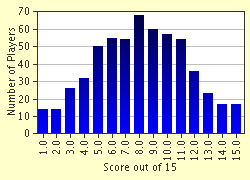Quiz Answer Key and Fun Facts
1. When did Germany FIRST become a unified country with a central government?
2. About how many states did the German Confederation (der Deutsche Bund) have when it was created in 1815?
3. Two states in the German Confederation were major European powers. One of these was Prussia. Which was the other?
4. In the period c. 1820-70 the German states were widely admired abroad not only for music, literature and philosophy but also for another achievement. Which of these was it?
5. Which German author enjoyed cult status in Germany from before the start of this period till 1860 and beyond?
6. Many states in the German Confederation were 'police states', especially in the period 1815-1848. What, however, did these nineteenth-century police states NOT do to those whom they regarded as subversives?
7. In 1848, German liberals, together with many conservative nationalists, elected a rebel Parliament. Where did it meet?
8. When (approximately) did industrialization start in Germany, albeit on a very small scale?
9. Prussia was keen to advance its commercial development and to this end established the 'Zollverein', to which other German states also belonged. What kind of organization was this?
10. Which politician is credited with the unification of Germany?
11. In 1878, the German government used two unsuccessful assassination attempts on the Kaiser as an excuse to ban one of the opposition parties and seize its assets. The ban remained in force till 1890. What was this party?
12. In 1897, Germany embarked on unsuccessful negotiations to form an alliance with another power. Which?
13. From the late 1890s onwards, Germany antagonized Britain by doing which of these?
14. What was the elected parliament of Imperial Germany called?
15. The Anglo-French "Entente Cordiale" of 1904 was intended from the outset as a means of "encircling" Germany.
Source: Author
bloomsby
This quiz was reviewed by our editing team before going online.
Any errors found in FunTrivia content are routinely corrected through our feedback system.
